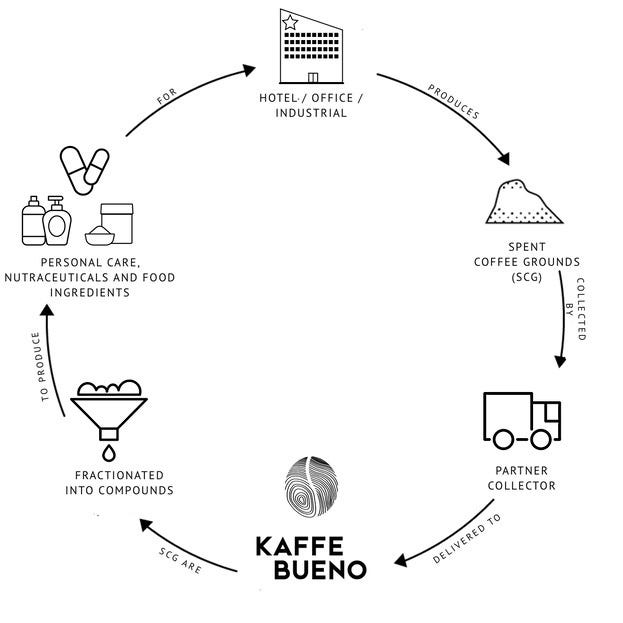🌱 Sourcing Surplus: Hate Waste, Love Wonky
Featuring Kaffe Bueno, Dash Water, Rubies in the Rubble, Too Good to Go and more...
Happy Friday!
This week we’re focusing on the up-cycling of food that was previously destined for the bin. We cover…
How Kaffe Bueno are super-charging circular coffee.
Why Dash Water are leading the way for wonky fruit and veg.
In case you missed it: Rubies in the Rubble are packing a punch in the fight against food waste, featuring Jenny Costa - Founder and CEO.
> Good News This Week
🎯 TENZING Natural Energy have certified as B Corp, becoming the worlds first energy drink to do so.
🎯 Dash Water are partnering with The Felix Project to donate 1 meal to schools and communities for every multi-pack sold in July.
⭐️ Alberto Balsam have launched a trio of shampoo bars packaged in 100% recyclable FSC certified cardboard.
⭐️ Unilever have confirmed plans to accelerate carbon labelling, with its whole range being labelled within 5 years.
⚡️ B Corp announced their ‘Best for the World’ brands - all of whom have scored in the top 5% of the B Impact Assessment for each category. Best for the World Environment winners from UK/Europe include: Freestar Drinks, ecoBirdy, Rambordn Cider, Mama Bamboo, Damiano Spa, and Alpro.
> Click on each link to read more.
> Quick Take
Super-charging Circular Coffee: Kaffe Bueno
Kaffe Bueno - Copenhagen’s very own biotech company specialising in the up-cycling of spent coffee grounds (SCG) - was founded in 2016 by three Colombian entrepreneurs. Their mission? Maximise coffee’s health enhancing properties and by-product usage, whilst minimising the release of harmful gases.
Coffee’s big and historical problem is that only 1% of its nutrients is used when a cup is brewed. 1%. The other 99% represents possible wastage - or in Kaffe Bueno’s case - a big cuppa potential. Apply that principle to the 2.25 billion cups of coffee consumed every day worldwide and that’s a lot of wasted opportunity. Additionally, up-cycling ensures that the toxic, caffeinated SCG doesn’t reach landfill - where, through decomposition, it would release Methane, a gas 86x more harmful than CO2.
So, how are Kaffe Bueno super-charging upcycling?
Kaffe Bueno have tapped into this nutrient-rich goldmine in Copenhagen by offering an innovative coffee recycling service. SCG are separated into compounds that Kaffe Bueno uses to make products such as “Kaffoil” and “Kaffibre”. Both have a multitude of uses across the functional foods and cosmetics industries, and soon-to-be nutraceuticals. Kaffibre boasts a strong nutritional profile and is caffeine, gluten, and fat-free - making it a suitable ingredient in baking and confectionery. However, suppliers must adhere to strict criteria; their SCG must be 100% Arabica and responsibly and sustainably sourced, with a transparent supply chain to farms. In return, Kaffe Bueno offers suppliers discounted up-cycled products, waste management training and workshops - as well as vital reports on emission reductions as a result of using the service. As a registered B Corp, Kaffe Bueno also have a social conscience, donating 1% of their profits towards education programmes in their native Colombia for coffee farmers.
What does this mean for brands?
Kaffoil’s production has led to the development of a range of skin-care products for Upcircle, Pasion, and Nivea - demonstrating a show of confidence in the quality and functionality of the product. Their innovative up-cycling service has enabled brands to take their own steps towards being more circular.
Sound tempting? Look for resources near you that can offer the same. For example, a widely available alternative is the award winning bio-bean.
Haven’t subscribed to Following the Footprints yet?
> Brand Spotlight
Dash Water: Wonky and Winning
7% of food grown in the UK never makes it to a plate, totalling £1 billion of goods going to waste. Worse? This percentage is even higher if you’re an innocent piece of fruit and veg - with 40% of fruit and veg grown in the UK being wasted. Why? It often comes down to looks. Up to 25% of apples are wasted on cosmetic grounds, irregardless of their taste or quality.
One brand doing their best to re-purpose fruit and veg that would’ve otherwise gone to waste for simply not being visually perfect for supermarkets is Dash Water. Founded in 2017 by Alex Wright and Jack Scott, both founders realised the scale of food waste at its source with farming backgrounds of their own. Now, Dash Water work closely with farmers in Herefordshire to source their surplus. From berries, to cucumbers, to lemons - they infuse gently bubbling spring water with real wonky fruit. Not only does this differentiate them from competitions based on their use of real ingredients (no artificial flavourings in sight), but also on their sustainability credentials.
After certifying as B Corp in October 2020 with a score of 81.7, customers can have an easy conscience with every sip. Recently, Dash Water partnered with CarbonCloud to count their carbon - concluding that for every kilogram of Dash, 0.33KG of CO2 emissions are produced. Not only are they adding this carbon label to their cans, it’s also helped them identify that a huge 68% reduction in emissions could be achieved by using 100% recycled materials in their can. Additionally, they’re working with Trees for Cities to offset any emissions produced whilst delivering Dash Water to your door. Finally, a recent partnership with The Felix Project has seen Dash commit to donating one free meal for every multi-pack of cans sold. Wow, they’re busy.
Their long term goal? Aiming to save 2,500 tonnes of wonky fruit and veg by 2025, whilst also becoming Net Zero.





